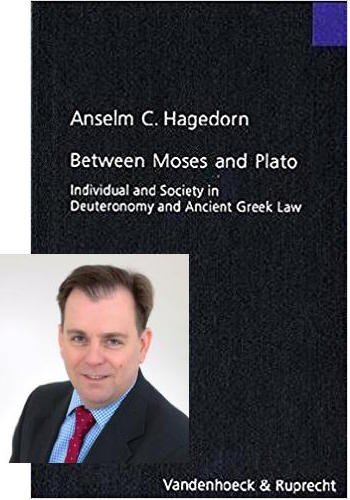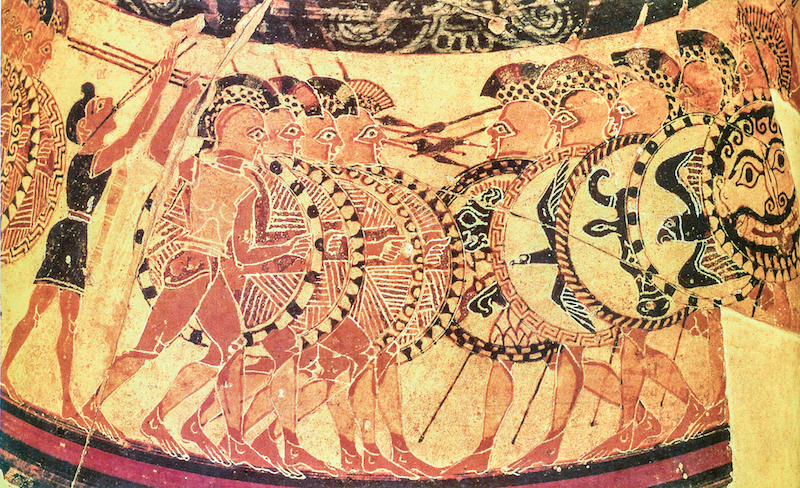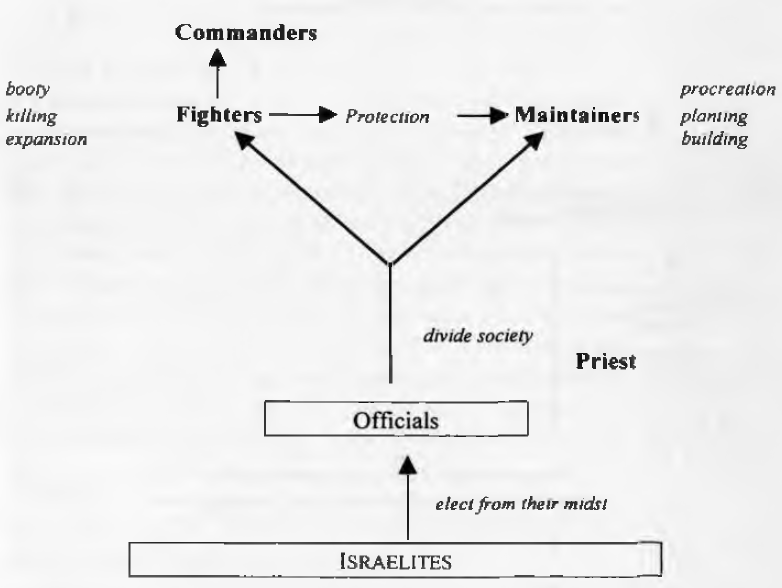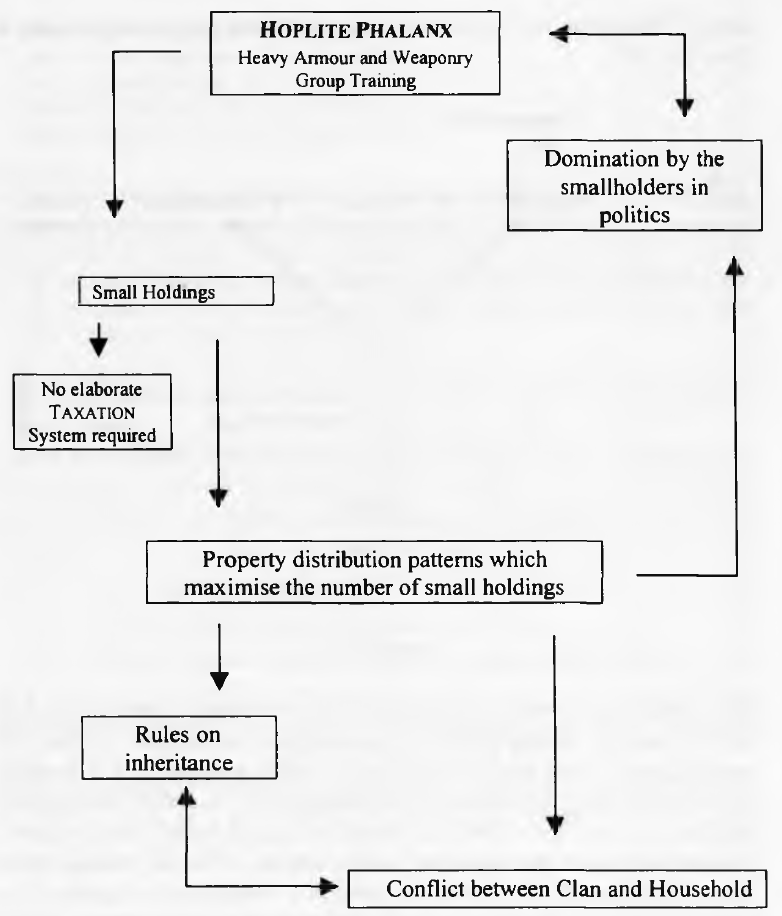 Continuing from previous posts, the following draws upon a secondary source used by Russell Gmirkin in Plato and the Creation of the Hebrew Bible in his discussion of military law as set out in Deuteronomy. The extracts that follow are from Anselm C. Hagedorn’s Between Moses and Plato: Individual and Society in Deuteronomy and Ancient Greek Law.
Continuing from previous posts, the following draws upon a secondary source used by Russell Gmirkin in Plato and the Creation of the Hebrew Bible in his discussion of military law as set out in Deuteronomy. The extracts that follow are from Anselm C. Hagedorn’s Between Moses and Plato: Individual and Society in Deuteronomy and Ancient Greek Law.
I have occasionally changed the formatting of Hagedorn’s text and a few times replaced Hebrew or Greek text with English translations. Some footnotes I have converted into hyperlinks to the source text.
Russell Gmirkin’s comparative conclusion goes beyond the details in Hagedorn’s discussion so I will quote that broader perspective before embarking on my Hagedorn study:
The lack of a military role for the king in Pentateuchal law contrasts with the king as leader of the army at war in both the Ancient Near East and in the historiography of the biblical monarchy. The citizen army described in both the narratives and legal passages of Exodus-Joshua corresponds closely to the Athenian model. The notion of military practices being governed or limited by law is characteristically Greek. The involvement of the national Assembly in negotiating peace treaties in wartime in Josh. 9 suggests a commitment to democratic practices similar to that found at Athens but unheard of in the Ancient Near East. The Deuteronomistic exemption from military duties for a soldier with a new house, vineyard or wife appears to have been modeled on the statutorial exemption from military training for an Athenian soldier who newly became head of a household through marriage or inheriting an estate. (Gmirkin, p. 125)
–o0o–
Military Law Between Moses and Plato
Deuteronomy 20
1 When you go to war against your enemies and see horses and chariots and an army greater than yours, do not be afraid of them, because the Lord your God, who brought you up out of Egypt, will be with you.
Hagedorn p. 176
“You” in Deut 20:1 is in fact the assembly of all male Israelites who will go out and fight. This phenomenon is well attested in the Greek world. In an inscription from Athens we have a decree regarding warfare, here we read:
“this decided in the Lykeion (the people of) Athens (Without the assembled people) it shall neither be (possible) to start a war (nor) to end one —“
The people are responsible for military action in the law and at the same time the δήμος πληθύων [=popular assembly] controls the actions of the council, a fact not represented in Deut 20:1-20. If the law is indeed directed towards the same individuals who are already responsible for the investiture of the judges and the king in the leges de officiis, we are now able to use the so called Hoplite model of the Greek city states to investigate further what implications a fighting male citizenship had on the society.
It is important to note that one was first a citizen and then a soldier and not vice versa. To maximise its numbers of Hoplites, every polis had to be very keen on the maximisation of smallholdings so that more citizens could afford Hoplite armour.

–o0o–
Deuteronomy 20
2 When you are about to go into battle, the priest shall come forward and address the army. 3 He shall say: “Hear, Israel: Today you are going into battle against your enemies. Do not be fainthearted or afraid; do not panic or be terrified by them. 4 For the Lord your God is the one who goes with you to fight for you against your enemies to give you victory.”
Hagedorn p. 181
The entry of the priest is described with, normally a terminus technicus for the appearance before a court. Only here in Deut 20 does the priest appear, after his exhortatory speech he steps back and the religious component is missing from now on.
–o0o–
Deuteronomy 20
5 The officers shall say to the army: “Has anyone built a new house and not yet begun to live in it? Let him go home, or he may die in battle and someone else may begin to live in it. 6 Has anyone planted a vineyard and not begun to enjoy it? Let him go home, or he may die in battle and someone else enjoy it. 7 Has anyone become pledged to a woman and not married her? Let him go home, or he may die in battle and someone else marry her.”
Compare Deuteronomy 24
5 If a man has recently married, he must not be sent to war or have any other duty laid on him. For one year he is to be free to stay at home and bring happiness to the wife he has married.
Hagedorn pp. 184-187
In Deut 20:5-8 . . . we find a series of exemptions from military service, introduced by the [officers]. . . .
These exemptions are generally seen as an indication of the specific humane nature of the deuteronomic legislation. The passage describes in an impersonal way . . . who is exempted from military service, using three parallel sentences.
The first instance deals with those people (undoubtedly men) who have just built a house and have not yet dedicated it. The verb is normally used is regard to the Temple, and only in Deut 20:5 does it refer to a private house, therefore we can only speculate on the concept of dedicating a house.
The second case deals with the planting of a vineyard using common vocabulary for such an act. The concept of having built a house and not being able to dwell in it, and to have planted a vineyard and not being able to enjoy its fruits, is a common scenario of horror in the Old Testament, as the following three texts similar to Deut 20 :5-7 will show:
The last stichos deals with engaged men. In addition to Deut 24:5, where the married man is exempt from military service, the law is here extended to engaged couples as well.
This quite humane stipulation in Deut 20:7 seems to have been the exception in the Ancient Near East. In The Legend of King Keret (KRT A ii: 85-103) we read for example:
“Muster the people and let it come forth.
The Host of the troops of the people.
Yea, let come forth the assembled multitude,
Thy troops a mighty force:
The solitary man closes his house,
The widow locks herself in;The sick man is carried in bed,
The blind man gropes his way.
Even the new-wed groom goes forth,
He drives to another his wife,
To a stranger his well-beloved …In addition to that, the triad house, vineyard and wife seems to reflect some sort of ideal state in antiquity, also known to the Greek authors:
Hesiod, Works and Days 405-410:
“First of all, get a house, and a woman and an ox for the plough and make everything ready at home, so that you may not have to ask of another, and he refuses you, and so, because you are in lack, the season pass by and your work comes to nothing”
. . . .
. . . Deuteronomy aims at the maintenance of Israelite society even in times of war. Therefore the author divides society into fighters and maintainers. Whereas the fighting group is responsible for protection, the so called maintainers have to take care of procreation, building and planting/harvest, essential tasks to ensure the continuation of Israel. If such balance is disturbed the worst case scenario has to be expected as described in Deut 28:30 . . . .
It may look as if we have here stipulations dealing with the individual Israelite, but in a group-embedded society the protection of the individual always aims at the protection of the group as a whole.
–o0o–
Deuteronomy 20
8 Then the officers shall add, “Is anyone afraid or fainthearted? Let him go home so that his fellow soldiers will not become disheartened too.”
Hagedorn pp. 187-189
This time, the exemption does not aim at the individual concerned but his fellow combatants. The legislator views a soldier who is fearful or a coward as an apparent danger, since such an attitude may spread. Maybe the verse has also been inserted to prevent shameful behaviour of warriors who first join the battle line and will run at the sight of the enemies. . . .
The fear in battle as a danger to one’s fellow warrior is also well attested in Greek literature. Euripides remarks:
Euripides, Heracles Furens 189-194
… now learn wisdom from my mouth:
The man at arms is bondsman to his arms,
And through his fellows, if their hearts wax faint.
Even through his neighbours’ cowardice, he dies
And, if he break his spear, he hath naught to ward
Death from himself, who hath but one defence.Deut 20:1 When you go to war against your enemies and see horses and chariots and an army greater than yours, do not be afraid of them, because the Lord your God, who brought you up out of Egypt, will be with you.
Deut 20:3 He shall say: “Hear, Israel: Today you are going into battle against your enemies. Do not be fainthearted or afraid; do not panic or be terrified by them
Deut 20:4 For the Lord your God is the one who goes with you to fight for you against your enemies to give you victory.”
A passage from Thucydides bears remarkable resemblance to Deut 20:1. General Brasidas says at the opening of a battle to his soldiers:
101 Thucydides 4 126 1
Did I not suspect, men of Peloponnesus, that you are in a state of panic because you have been left alone, and because your assailants are barbarous and numerous, I should not offer you instruction combined with encouragement.
The Peloponnesian general basically fulfills the same rule as the supposed Mosaic speaker in Deut 20:1 and later on the priests in Deut 20:3. The reason for the panic of the soldiers is again the large number of enemies, but the religious component is absent from Thucydides. Nevertheless, religion and sacrifice were an important factor in every Greek military campaign and in a fragment from Euripides we read an attitude similar to Deut 20:4:
102 Euripides, Erechtheus, fr 352:
It is with the gods’ help that wise / commanders launch an attack, / never against their wishes.
It is reported from the Spartan army, that before every military expedition, the king sacrificed in his own house to ‘Zeus Agetor‘ (i.e. Zeus, who leads out), and in Deut 20:4a it is said of YHWH: “For the LORD your God is the one who goes with you.”
–o0o–
Deuteronomy 20
9 When the officers have finished speaking to the army, they shall appoint commanders over it.
This passage in Deuteronomy is the only place in the Bible indicating that generals are to be elected from the assembly of adult Israelite males. Hagedorn reminds readers that
In Athens for example, the στρατηγοί [generals] were a board of ten elected magistrates in charge of military affairs, see Ostwald 1986: 21-23; Hansen 1992 268-271
Hagedorn pp. 188-191
Deut 20:9 forms an inclusion to Deut 20:5 -7.8 (sic) . . . stating that the “officers” shall appoint “commanders” to lead the army. Therefore, we find the following stratification of Israelite society in Deut 20:1-9:
This division of society into fighters and maintainers serves a twofold purpose here:
- as already mentioned, it guarantees that Israelite society will remain forever,
- and on the other hand, I would propose it is a measure regarding property distribution.
If the planting of a vineyard, marriage and building a house are viewed as modes to acquire wealth and property, features that would then allow the Israelite citizen – if we are staying within the Hoplite model — to afford the weaponry necessary for fighting, the sending home of a significant portion of the citizens in arms is then a way to maximise the fighting population and as such the military basis of the state.
If that is the case, we can modify our chart regarding the influence of Hoplites on their host society further: (from Carney 1975: 239)
. . . If the distribution of property is vital to the maximisation of military power, certain rules of inheritance are expected. Probably Deut 21:15-17 can also be seen in this context: the society has to take care that the small holdings do not get too small, thus prohibiting the owners from producing enough to be able to afford weaponry. Limited space does not allow us to elaborate on this issue in great detail, and it might be enough to note here that in a society where the people fight as citizens in arms, and not as subjects of a king, the need for wealth to afford weaponry necessarily structures society. . . . If a large number of citizens are responsible for the defence of the city or the land, it is hardly surprising that these citizens also dominate the politics of the state, and clearly Deut 20:1 has the same “you” in mind that has already been responsible for the investiture of judges and officials and the election of the king from amongst “your brothers”.
–o0o–
Deuteronomy 20
19 When you lay siege to a city for a long time, fighting against it to capture it, do not destroy its trees by putting an ax to them, because you can eat their fruit. Do not cut them down. Are the trees people, that you should besiege them? 20 However, you may cut down trees that you know are not fruit trees and use them to build siege works until the city at war with you falls.
Hagedorn pp. 195-197
The destruction of the natural resources o f the country seems to have been common practice during war in Antiquity. In the Old Testament we read in 2Kgs 3:19,25:
19 . . . You will cut down every good tree, stop up all the springs, and ruin every good field with stones.”
25 They destroyed the towns, and each man threw a stone on every good field until it was covered. They stopped up all the springs and cut down every good tree. . . .
Also in the Ancient Near East and Ancient Greece we have reports of devastating campaigns, as the following examples will show:
This army returned in safety,
after it had thrown down its enclosures.
This army returned in safety,
after it had cut down its fig trees and its vines … [ANET 228]Expedition of Thut-mose Campaign 5
Now his majesty destroyed the town of Ardata, with its grain. All its pleasant trees were cut down. Now [his majesty] found [the] entire [land of] Djahi, with their orchards filled with their fruits. [ANET 239a]
Shalmanasser III. The fight against the Aramean Coalition
I defeated Hadadezer of Damascus together with twelve princes, his allies. I stretched upon ground 20,900 of his strong warriors like su-bi; the remnants of his troops I pushed into the Orontes river and they dispersed to save their lives. Hadadezer [himself] perished. Hazael, a commoner … seized the throne called up a numerous army and rose against me. I fought with him and defeated him, taking the chariots of his camp. He disappeared to save his life. I marched as far as Damascus, his royal residence [and cut down his] gardens. [ANET 280]
Herodotus 1.17:
he sent his invading army, marching to the sound of pipes and harps and flutes bass and treble, when the crops of the land were ripe but the trees and the crops of the land he destroyed, and so returned whence he came The reason why the Lydian did not destroy the houses was this – that the Milesians might have homes whence to plant and cultivate their land and that there might be the fruit of their toil for his invading army to lay waste See also Lysias 7.7; Xenophon, Hell. 4.5.19
Hagedorn’s Conclusion
As a whole, we simply do not have any descriptions of war according to Deut 20 in the Old Testament besides in Deuteronomy itself.
The application of the model of Hoplite warfare has shown that the laws in Deut 20:1-9 are on the one hand concerned with the maintenance of the society and on the other hand determined by the striving for maximisation of independent households, since these households are responsible for the number of men in arms. Of course it is not possible to argue that a concrete battle formation such as the phalanx has also been used in the Israel envisaged in Deuteronomy. However certain features known to us from the Greek world such as the elections of generals and a mode of fighting without any central authority such as a king can also be found in the Biblical text. In contrast to the wars reported in the Deuteronomistic History, warfare according to Deuteronomy is a democratic enterprise. (p. 199)
Commercial Law
I leave aside Russell Gmirkin’s discussion of commercial law. Though containing lots of detail I found comparing the information across the biblical, Near Eastern and Greek worlds difficult. Either I missed them or as a result of some glitch in editorial oversight necessary data and references that would enable an evaluation of the argument seemed to be missing or only very indirectly related to the point made. I did consult a number of the works in the endnotes but still had questions remaining, so I proceed directly to Gmirkin’s discussion of Military Law.
If you enjoyed this post, please consider donating to Vridar. Thanks!


